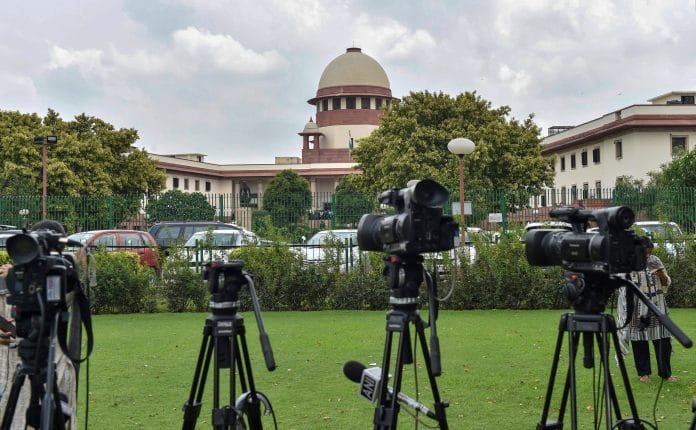Live streaming court cases are a major risk in India, especially for sensitive cases like Ayodhya or caste reservation.
The Supreme Court Friday reserved orders on the petition by Indira Jaising to start live streaming court hearings.
Attorney General (AG) K.K. Venugopal representing the Modi government had also filed possible guidelines for live hearings. All parties involved were delighted. What can possibly go wrong with people watching the dispensation of justice live on national television?
Citizens travel from across the country to reach the Supreme Court. They believe in the courts not because the judges are speakers of infallible truth, but because their decisions stem from a due process of law, which promises fairness and neutrality. The judiciary’s legitimacy is due to these processes. And, it is this legitimacy that is essential in bringing closure to disputes, which affect rights of individuals and collective entities.
Also read: Indian judiciary doesn’t need to fear the government; it needs to be afraid of itself
Several democracies across the world are also debating whether to open up this process to public eyes.
Tony Mauro, a legal correspondent in the US, writes that courts incorrectly feel they are unique institutions and should therefore not face public scrutiny of the kind that the live camera enables. He sees the 24×7 media and information age as a reality that will benefit the court. In line with this view, pilot programmes have been conducted in several states of the US.
A plea by the civil society for live cameras has also been raised in England. The demand picked up momentum in the aftermath of the 2011 London riots. Several members of civil society and the political class came together forcing the government to move towards live streaming.
In 2017, South Africa saw the Supreme Court of Appeal uphold the trial court’s order to broadcast live the trial in the Van Breda case, where the accused had allegedly murdered three members of his family with an axe. With the celebrity trial of Oscar Pistorius, the live streaming of court cases might slowly become the norm.
The petitioners in our Supreme Court in Indira Jaising v. Registrar, Supreme Court of India also used an open justice system and increased institutional credibility as arguments for live streaming.
These arguments are flawed and short-sighted. In fact, live camera proceedings are not only not required, but may actually jeopardise the very spirit of a democracy that such a move seeks to ensure.
Also read: Jains of Jodhpur- How a tiny community ruled India’s Supreme Court
Fali Nariman was not impressed when the four judges of the Supreme Court held a press conference claiming that democracy was at risk. This act was hailed by many as necessary to defend the constitutional role of the courts. I agree with such a position. However, I am attentive to Nariman’s concern that the judiciary can ill afford a situation where judges have to take recourse to public opinion for their legitimacy.
First, there is no reason to suggest that the rule of law, already based on mandated processes, would be enhanced by providing live streaming of hearings.
Law, for centuries, has evolved as a product of legal methodology and principles, which strive to create a system that promotes fairness and neutrality. This has ensured that the court in most modern democracies functions as an anti-majoritarian institution. To now seek legitimacy from majoritarian appeal is the antithesis of the rule of law.
Second, the argument that live streaming is simply a matter of evolving with technology is incorrect. As sociologist Jean Baudrillard recorded in his writings on the Gulf War, TV provides a selective form of representation which can manipulate the public discourse. Selective shots/quotes sought to show the Gulf War as one of precision and efficacy, not one of brutal deaths. The same misrepresentation is likely to happen with major cases that affect the rights of people.
Third, let us be clear that the courts are distinct and exceptional institutions. As the final arbiters of the Constitution, their role is exclusive and their legitimacy is premised on constitutional provisions and procedure codes. Expert knowledge here strengthens democracy. It is not necessarily contradictory to the spirit of democracy — a populist argument that has gained ground in recent times. Legal hearings can be attended by all those interested and are accessible to those whose rights are infringed. All judgments are in public domain and proceedings are neither exclusive nor mysterious.
Also read: India’s privacy ruling is a year old & we haven’t even unpacked its full potential
Fourth, live streaming is premised on the argument that the proliferation of information necessarily enables better communication and understanding. However, instant access does not translate into equal access to information, given the unequal levels of knowledge in India. Legal procedures and precedents are often matters of expert knowledge and are central to decision-making. The judges already operate within this legal body and television will only seek to move them from testing orders on jurisprudence to popular opinion. Imagine the implications for democracy if the Ayodhya matter or the caste reservation issue are to be broadcasted in times of majoritarianism and sensationalised 24×7 journalism? During the hearing Friday, Justice Chandrachud did say that cases which have communal repercussions may not be shown live.
Fifth, populism cannot become the premise of testing the ability and credibility of anti-majoritarian institutions. Populists can always play off the “real people” against time-tested legal procedures.
The court, one hopes, will test the live streaming petition on whether or not it strengthens the independence of the judiciary and its functioning as an anti-majoritarian institution.
Abhik Chimni practises at the Supreme Court and writes on issues of law. He can be reached @abhik_chimni






